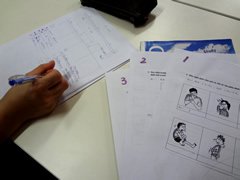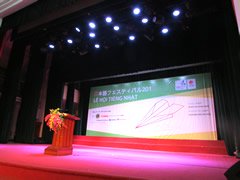2017 Japanese-Language Assistants’ Report: Interesting Things I Have Found in Hanoi
The Japan Foundation Center for Cultural Exchange in Vietnam
KUBOTA Ikumi
I have been assigned to the Japan Foundation Center for Cultural Exchange in Vietnam (hereafter referred to as "JFVN") in Hanoi, the capital of Vietnam. I would like to share with you two of the things that make working in Hanoi so interesting. It's about thinking together with others and getting a glimpse of different interactions.
Think with Others

Class preparation meeting
I believe that the term "teaching" includes "preparation," "teaching," and "review."
I usually provide classroom support for Vietnamese teachers who teach Japanese at junior and senior high schools in Hanoi. Sometimes we prepare for classes together, and sometimes I go into the class on the day of the class to assist the teacher. However, teachers who have been teaching in the field for many years know more about Vietnam, the students, and the textbooks, so you may wonder what kind of support a first-time Japanese-Language Assistant (hereafter referred to as "Assistant") in Vietnam, who has been dispatched for only two years, can provide. I still feel the same. However, the most important thing for me is the "class preparation" with the teacher.
For example, I have been asked, "After introducing vocabulary, I would like to do a group activity to help the students memorize the words, but what should I do?" You can find a wealth of information in reference books and activity books, but I would first ask the teacher various questions, such as "Why is a group good?", "What doesn't work in your usual teaching style?", and “What is the activity that you have in mind”? In this way, you can learn a little bit about the teacher's teaching style, what they usually place importance on, and the atmosphere of the students in the class. When we discuss the "question" of the day together as I follow each of the teacher’s opinions (while sometimes thinking the opposite), we will naturally come up with our own "answer."
It takes a lot of time and energy to think and discuss things in a roundabout way, but I feel from my contact with teachers in Hanoi that this process is important in class preparation. In addition, through this job, I have been able to come into contact with various views on education, and I feel that this has contributed to my own learning.
Various Interactions
Here, I would like to introduce the Japanese Camp for Junior High School Students in Vietnam (hereafter referred to as "Junior High School Camp") and the Japanese Language Festival, both of which the Assistants in Hanoi are involved in planning and running.
The Junior High School Camp is held in July, which is the summer vacation in Vietnam, for students and teachers from all over the country. In 2016, 54 students and 23 teachers from all over the country gathered in Hanoi to engage in a variety of activities. We also asked university student volunteers to participate in the preparation period, and on the day of the event to provide support.
The Japanese Language Festival is held every year in April and May, and consists of two parts: a speech contest in which about 10 people are selected from four regions including Hanoi, and a performance contest in which people sing and dance. This is a large scale festival held in a hall with a capacity of 500 people, sponsored by many organizations. In past years, most of the participants have been university students, but this year we had a wide range of participants, including junior and senior high school students, working adults, and NIHONGO Partners who participated in the performance division.

Japanese Language Festival 2017
These are two completely different events, but the moment I feel glad to have managed this project is when I catch a glimpse of the participants getting to know each other, chatting, and encouraging each other. In both projects, the main goal is not for the participants to get along with each other. However, some of the students were having fun with their friends even though they had never met each other before, others were admiring their senior university student volunteers and trying to talk to them, and still others, nervously waiting in the wings, were cheering on other groups, and chatting amicably with the presenters after their presentations. These scenes are just small things that happen in one event, but to me, they feel like great things. This may be a good opportunity for them to continue to interact with each other in some way, and may motivate them to do some things.
There is no way to prepare or predict how much interaction will occur on the day of the event, but I look forward to seeing the connections made on the day remain and develop in some form in the future. In the case of the Junior High School Camp and the Japanese Language Festival, the amount of work that goes into planning and running the event is huge, but in exchange for that, there is great joy in seeing the interaction that occurs among the learners and participants.
I have written about a few of the activities I am involved in, but these are the things that I have found to be the best part of my tenure as an Assistant.
- What We Do Top
- Arts and Cultural Exchange [Culture]
- Japanese-Language Education Overseas [Language]
- Japanese-Language Education Overseas [Language] Top
- Learn Japanese-language
- Teach Japanese-language
- Take Japanese-Language Test
- Know about Japanese-language education abroad
- The Japanese-Language Institute, Urawa
- The Japanese-Language Institute, Kansai
- Japanese-Language Programs for Foreign Specified Skilled Worker Candidates
- Japanese Language Education for Japanese Children Resident Overseas and for the Descendants of Migrants
- Archives
- Japanese Studies and Global Partnerships [Dialogue]
- JF digital collection
- Other Programs / Programs to Commemorate Exchange Year
- Awards and Prizes
- Publications
